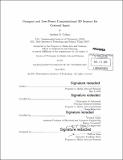Compact and low-power computational 3D sensors for gestural input
Author(s)
Colaç̦o, Andrea B. (Andrea Brazilin Immaculate Danielle)
DownloadFull printable version (18.26Mb)
Other Contributors
Massachusetts Institute of Technology. Department of Architecture. Program in Media Arts and Sciences.
Advisor
Christopher M. Schmandt and Vivek K. Goyal.
Terms of use
Metadata
Show full item recordAbstract
Mobile devices have evolved into powerful computing platforms. As computing capabilities grow and size shrinks, the most pronounced limitation with mobile devices is display size. With the adoption of touch as the de facto input, the mobile screen doubles as a display and an input device. Touchscreen interfaces have several limitations: the act of touching the screen occludes the display, interface elements like on-screen keyboards consume precious display real estate, and navigation through content often requires repeated actions like pinch-and-zoom. This thesis is motivated by these inherent limitations of using touch input to interact with mobile devices. Thus, the primary focus of this thesis is on using the space around the device for touchless gestural input to devices with small or no displays. Capturing gestural input in this volume requires localization of the human hand in 3D. We present a real-time system for doing so as a culmination of an exploration of novel methods for 3D capture. First, two related systems for 3D imaging are presented, both relying on modeling and algorithms from parametric sampling theory and compressed sensing. Then, a separate system for 3D localization, without full 3D imaging, is presented. This system, Mime, is built using standard, low-cost opto-electronic components - a single LED and three baseline separated photodiodes. We demonstrate fast and accurate 3D motion tracking at low power enabled by parametric scene response modeling. We combine this low-power 3D tracking with RGB image-based computer vision algorithms for finer gestural control. We demonstrate a variety of application scenarios developed using our sensor, including 3D spatial input using close-range gestures, gaming, on-the-move interaction, and operation in cluttered environments and in broad daylight conditions.
Description
Thesis: Ph. D., Massachusetts Institute of Technology, School of Architecture and Planning, Program in Media Arts and Sciences, 2014. 87 Cataloged from PDF version of thesis. Includes bibliographical references (pages 141-150).
Date issued
2014Department
Program in Media Arts and Sciences (Massachusetts Institute of Technology)Publisher
Massachusetts Institute of Technology
Keywords
Architecture. Program in Media Arts and Sciences.